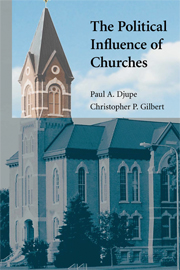Book contents
- Frontmatter
- Contents
- Acknowledgments
- Introduction: A Theory of Religious Influence on Political Behavior
- 1 Social Networks and Church Structure
- 2 Clergy Influences and Religious Commitment Reconsidered
- 3 Church-Centered Influences on Public Opinion
- 4 The Resourceful Believer
- 5 The Construction of Political Mobilization in Churches
- 6 Present but Not Accounted for?
- 7 Conclusion
- Appendix: Variable Coding
- References
- Index
4 - The Resourceful Believer
Generating Civic Skills in Church
Published online by Cambridge University Press: 05 June 2012
- Frontmatter
- Contents
- Acknowledgments
- Introduction: A Theory of Religious Influence on Political Behavior
- 1 Social Networks and Church Structure
- 2 Clergy Influences and Religious Commitment Reconsidered
- 3 Church-Centered Influences on Public Opinion
- 4 The Resourceful Believer
- 5 The Construction of Political Mobilization in Churches
- 6 Present but Not Accounted for?
- 7 Conclusion
- Appendix: Variable Coding
- References
- Index
Summary
effective representation must always be a central concern in democratic polities. Addressing questions of representation involves institutional structures in part, but much of the responsibility for assuring adequate representation falls to citizens directly. The public must participate through available channels, though not everyone has the resources, interest, and invitation necessary to do so. There is near universal agreement that civil society can subsidize these deficits of crucial participatory ingredients, but researchers have often mischaracterized the problems being addressed and have failed to explore the nature of civil society's solution to sufficient depth.
Both of these concerns alter the nature of inquiry into representational deficits. First, while underrepresentation should be conceptualized in part as a problem individuals own through a lack of resources or motivation, it is just as significantly a community-based problem. Even resourceful people can be underrepresented due to extant conditions where they live. Therefore, the question can be recast: how can civil society rectify an imbalance of representation in a community where some people (perhaps independent of their personal resources) are socially marginalized? Second, the groups that assist individuals to acquire the tools necessary to boost political participation may be subject to the same dynamics that produce the community imbalance – some groups may not have the same access to civil society as others.
To rectify these critical concerns, this chapter examines how one important institution of civil society, the church, distributes access to one crucial resource needed for political activity: civic skills.
- Type
- Chapter
- Information
- The Political Influence of Churches , pp. 155 - 176Publisher: Cambridge University PressPrint publication year: 2008



